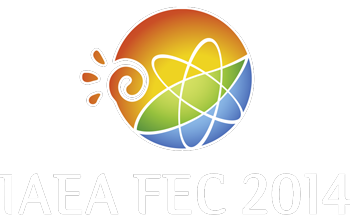Speaker
Prof.
Yong-Su Na
(Seoul National University)
Description
The ohmic breakdown is the one of major methods to initiate the plasma in various devices. The electron avalanche, the main mechanism of the ohmic breakdown, is well described by traditional Townsend avalanche theory in the case of low pressure gas and simple slab geometry. The physical mechanism of the ohmic breakdown process in the tokamak, however, is not fully understood yet due to time-varying complex electromagnetic fields in toroidal geometry entirely different from the simple slab case. A deep understanding of the ohmic breakdown physics is essential to design robust and optimal breakdown scenarios in tokamak devices. Previous studies have focused on the qualities of the electromagnetic fields produced by external coil systems and by eddy currents induced in the vacuum vessel based on the Townsend avalanche theory. The avalanche phenomena during the breakdown, however, could be significantly affected by electric fields induced in the plasma due to space charge accumulated in the device. In this research, a PIC(Particle In Cell)-MCC(MonteCarlo Collision) code is developed to simulate the avalanche phenomena in the tokamak considering the space-charge effect and various atomic physics. The developed code is applied to the breakdown scenarios of tokamaks such as KSTAR and VEST tokamak. We found that the self-induced electric fields play crucial roles by decreasing the plasma density growth rate and by enhancing the perpendicular transport due to ExB drift. The space-charge effects newly observed in this research could be important clues to a deeper understanding of unresolved issues of the ohmic breakdown in the tokamak.
| Country or International Organisation | Korea, Republic of |
|---|---|
| Paper Number | PPC/P8-16 |
Author
Mr
Min-Gu Yoo
(Seoul National University)
Co-authors
Dr
Bongki Jung
(Seoul National University)
Prof.
Hae June Lee
(Pusan National University)
Dr
Jayhyun Kim
(National Fusion Research Institute)
Mr
Seung Bo Shim
(Pusan National University)
Prof.
Taik Soo Hahm
(Seoul National University)
Prof.
Yong-Seok Hwang
(Seoul National University)
Prof.
Yong-Su Na
(Seoul National University)
Mr
YoungHwa An
(Seoul National University)

